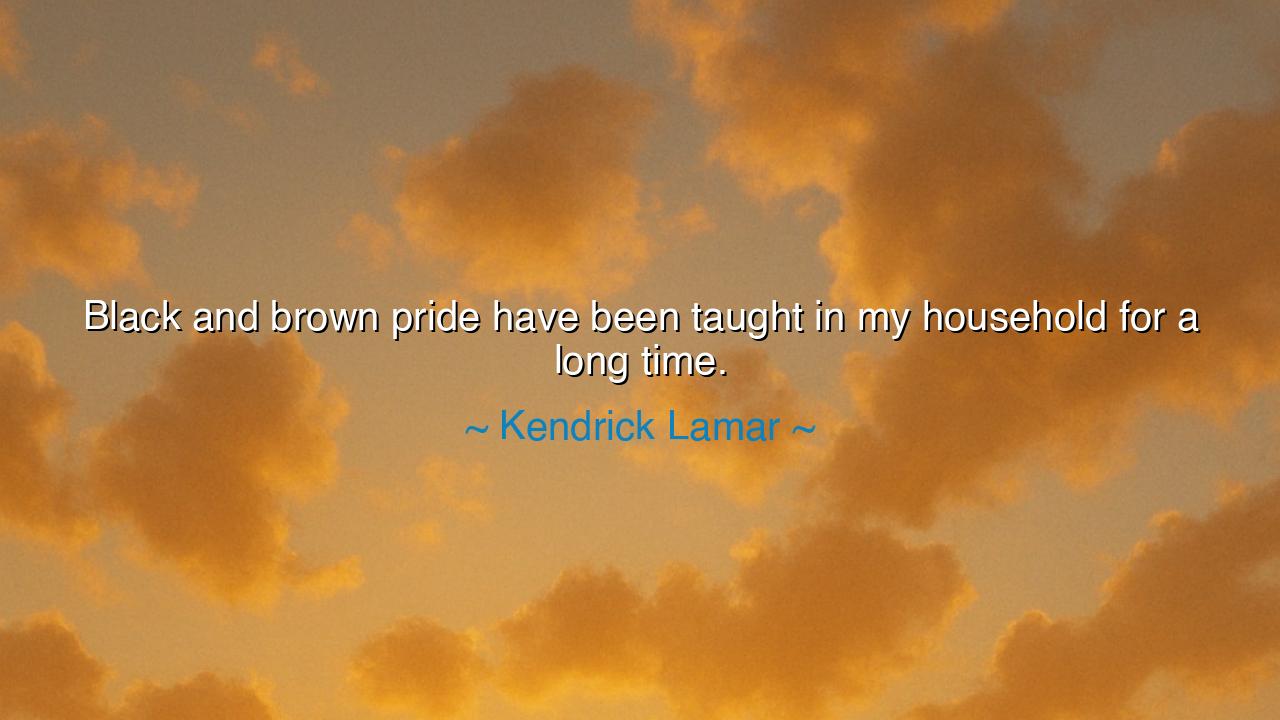
Black and brown pride have been taught in my household for a






Hear, O children of memory and inheritance, the words of Kendrick Lamar, poet of struggle and prophet of rhythm: “Black and brown pride have been taught in my household for a long time.” Though simple in sound, these words ring with the strength of generations. For they are not merely about color, nor only about pride, but about a sacred teaching—passed down from father to son, from mother to daughter, from ancestor to child—that dignity is not granted by the world, but carried within the soul.
To speak of Black and brown pride is to recall centuries where such pride was denied, where chains sought to strip it away, where laws and hatred tried to bury it. Yet in the face of oppression, families became temples of remembrance, households became schools of resilience. Around kitchen tables, in whispered prayers, in songs sung late into the night, parents taught their children: you are worthy, you are strong, you are beautiful, you are not less than any other. This is the origin of Lamar’s words—a heritage of love forged in struggle, a torch passed in darkness.
Consider the story of the Harlem Renaissance, when artists and thinkers rose to proclaim their worth in a nation that doubted them. Langston Hughes wrote, Zora Neale Hurston told stories, Duke Ellington filled halls with music, each voice declaring: we are proud of who we are. They were the sons and daughters of households where pride was planted like seed, watered by resilience, guarded by hope. Just as Lamar’s family instilled pride in him, so too did families long before instill pride in those who became giants of art and culture.
Think also of César Chávez, leader of farmworkers, who spoke for the dignity of brown laborers whose hands fed the land but whose worth was despised. His strength did not rise from himself alone but from the pride taught in his home, from his mother’s lessons of justice, from the stories of ancestors who endured hardship with dignity. It was this brown pride, nurtured in the heart of a child, that later became the courage of a leader.
The meaning of Lamar’s words is therefore this: that pride is not arrogance, but survival. It is the shield against shame, the voice that whispers in times of scorn, “Stand tall.” Without such pride, despair would devour the soul; with it, men and women endure, create, and rise. It is not a pride that excludes, but a pride that heals, reminding each generation that they belong to a lineage of strength and beauty that cannot be erased.
The lesson for us, O seekers, is to tend the fire of dignity in our own households. Teach children not to bow to the world’s scorn. Speak often of heritage, of resilience, of the sacrifices of those who came before. Celebrate identity, not as a weapon of division, but as a foundation of strength. In doing so, you prepare hearts to withstand trials and to rise above them with grace.
Practically, this means honoring your roots: read the stories of your ancestors, celebrate their songs, tell their tales to your children. Refuse to let the world define you; define yourself with pride and with love. Create spaces—at your tables, in your schools, in your communities—where the young can hear: you are worthy, you are powerful, you are enough. For when Black and brown pride is planted early, it grows into leaders, artists, healers, and visionaries.
So let these words of Kendrick Lamar be carried as a sacred inheritance: pride taught at home becomes power in the world. Let no one despise who you are, and let no one strip away the dignity that has been passed to you through generations of endurance. For the future belongs to those who know their worth, and who rise with the memory of their ancestors burning like a torch in their hands.
––






AAdministratorAdministrator
Welcome, honored guests. Please leave a comment, we will respond soon